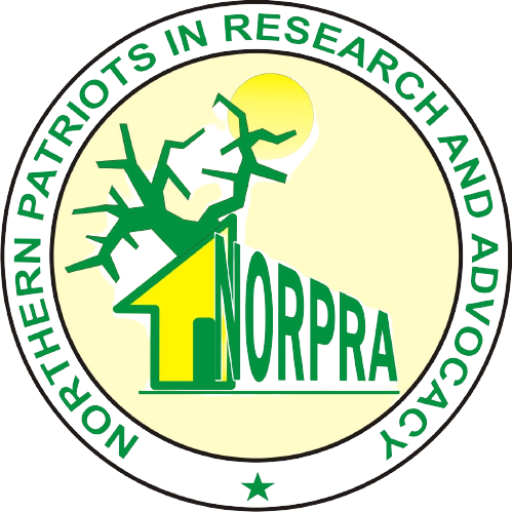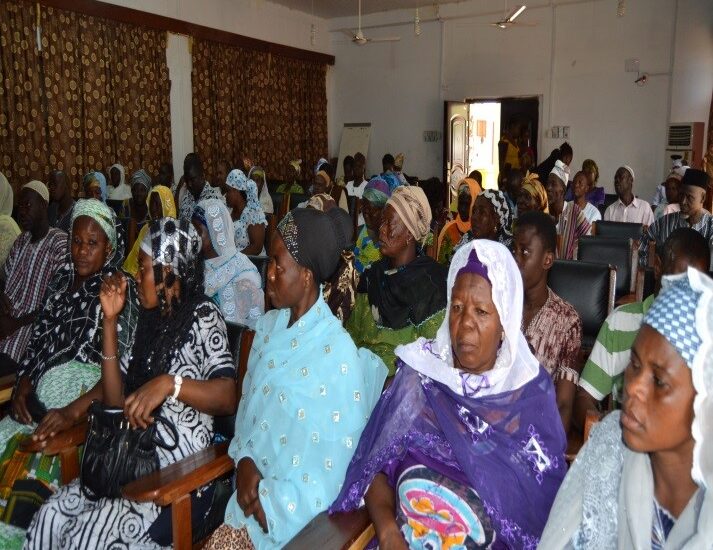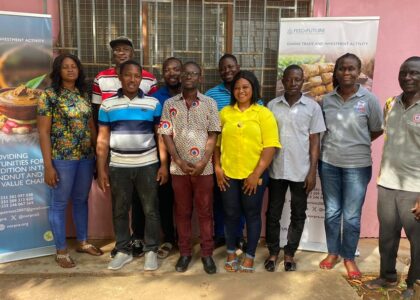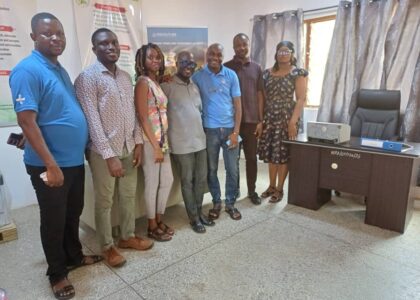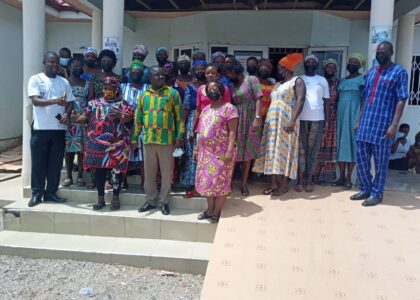REPORT ON CAPACITY STRENGTHENING SESSIONS WASH RIGHTS ADVOCACY, WASH BUDGET ADVOCACY AND WASH GOVERNANCE & LEADERSHIP
SUBMITTED BY
BONGO CSOs PLATFORM ON SDGS (NORPRA)
TO
WATER AID GHANA
10TH MARCH, 2023
Introduction:
The BongoCivil Society Organizations (CSOs) Platform on Sustainable Development Goals (SDGs) with the Northern Patriots in Research and Advocacy (NORPRA) as its convener has since 2019 received a number of capacity-building training on Water, Sanitation, and Hygiene (WASH) and received funding support to engage in WASH advocacy. In 2023, the Platform had funding support to mobilize women and Advocacy Team Members from the various communities in the Bongo district for capacity strengthening on WASH Rights and Budget advocacy as well as WASH Governance and Leadership training.
The overall objective of these activities was to promote universal and inclusive WASH service delivery and sustainable management and utilization of WASH facilities for improved WASH security in Bongo District.
WASH Rights Advocacy Strengthening Session 1
The WASH Rights Advocacy Strengthening Session was organized by the Bongo (CSOs) Platform on SDGs held on the 2nd of February, 2023 in the Bongo District Health Directorate Conference Hall. The session with the objective of strengthening the capacity of community women groups to assert and claim their rights to water, sanitation, and hygiene (WASH) in their communities brought together 26 women made up of 20 adults 3 young people, and 3 persons with disability from the various communities in the Bongo district for the capacity strengthening.
The session was in two parts, the first part focused on rights while the second part dealt with advocacy. Ms Princella Agesine of Ghana Red Cross Society who facilitated the first part of the session took the female participants through Human Rights, WASH Rights, Key Elements of Rights to WASH, the SDGS and the Right to WASH, the 1992 Constitution and the Right to WASH, the Coordinated Programme of Economic and Social Policies of the Government and the Right to WASH and finally, the 2023 WASH Plan of Bongo District Assembly.
After brainstorming on what human rights are and expressing views in the local language with popular local songs on WASH, the facilitator explained that human rights are rights that people have by virtue of being human beings. She said human rights are universal and these universal rights are inherent to us all, regardless of one’s nationality, sex, ethnic origin, color, religion, language, or any other status. She explained that the Universal Declaration of Human Rights (UDHR), adopted by the UN General Assembly in 1948, was the first legal document to set out the fundamental human rights to be universally protected. The Principles of Human Rights such as universality, inalienability, indivisible, interdependent, equality, and non-discriminatory were stated and discussed.
In explaining what WASH Rights are, she said the right to safe drinking water which was first recognized by the United Nations (UN) in 2010
entitles everyone to have access to sufficient, safe, acceptable, physically accessible, and affordable water for personal and domestic use. Still on WASH rights, she discussed with participants that the right to sanitation which was equally recognized by the UN in 2016 entitles everyone to have physical and affordable access to sanitation in all spheres of life, that is safe, hygienic, secure, and socially and culturally acceptable and that provides privacy and ensures dignity.
She mentioned Availability, Affordability, Accessibility, Acceptability, Quality, and Safety as key elements of Rights to WASH and gave a detailed explanation of each of the elements in the local language citing a number of examples for better understanding of participants.
SDGS and Right to WASH
Next in the presentation were the Sustainable Development Goals (SDGs) and the right to WASH. She discussed with participants what the SDGs as global development agenda stand for and said under SDG 6, Ghana and for that matter, Bongo district was not only enjoined to achieve universal and equitable access to safe and affordable drinking water for all but also to achieve access to adequate and equitable sanitation and hygiene for all and, of course, bring an end to open defecation. It was pointed out that government under the SDG 6 had a responsibility of paying special attention to the needs of women and girls and those in vulnerable situations, improving water quality by reducing pollution, and strengthening the participation of local communities in improving water and sanitation management.
The 1992 Constitution of Ghana and the Right to WASH
The 1992 Constitution of Ghana was also referenced as one legal document that guaranteed the human rights of all individuals in Ghana. It was pointed out that though the right to water and sanitation was not explicitly stated in the 1992 Constitution, Chapter 5 of the Constitution titled Fundamental Human Rights and Freedoms provided for rights such as the right to life, economic rights, and women’s rights. She explained that it is generally accepted that water is life and once the Constitution guaranteed the right to life, by implication, the Constitution recognizes the right to WASH. She added in her explanation that they cannot be full protection, respect, and enjoyment of economic rights and women’s rights without recognition of the right to WASH.
The Coordinated Programme of Economic and Social Policies of the Government (2017-2024) and Right to WASH
Referencing another policy framework of the Government, the Coordinated Programme of Economic and Social Policies, (2017-2024), she discussed with participants that the government had stated in that policy document that improving access to water services for all was one of its priority areas and said this was another important source that anyone making asserting his or right to WASH could make reference to.
WASH Plan and Right to WASH
Taking participants through the 2023 WASH Plan of the Bongo District Assembly and the Right to WASH, she shared the objectives of the WASH Plan and stated that the first objective seeks to Improve potable water supply coverage from 80.45 % in 2016 to 90 % by the end of 2025 through the construction of appropriate water facilities, focusing particularly on communities where the need is greatest.
According to her while the second objective of the plan is to improve sanitation coverage from 20% in 2016 to 30% by the end of 2025 through the adoption of innovative techniques in safe sanitation promotion and providing targeted subsidies to the poor and vulnerable, that of the third objective is to establish operation, maintenance and management systems in order to ensure the sustainability of investments in water in the district.
She explained and facilitated discussions on the opportunities that the WASH Plan provides for citizens to engage the government to fulfill its obligations to achieve SDG 6 and to protect and respect the right to WASH.
WASH Rights Advocacy Strengthening Session 2
The 2nd part of the WASH Right Advocacy Strengthening Session was on how to effectively advocate for the WASH Rights that have been presented and discussed in the first part of the session. Bismark Adongo Ayorogo of Northern Patriots in Research and Advocacy, (NORPRA) facilitated the session. Participants were taken through the concept of Advocacy, WASH Rights Advocacy, and the Advocacy Cycle and Strategy.
Advocacy: A process of organized actions directed at influencing people, policies, structures, and systems in order to bring about positive change in the lives of the disadvantaged
Blending both the local language and English Language in the facilitation for the purpose of better understanding of the issues, the facilitator explained that advocacy is about influencing the promotion, protection, and respect for human rights including the right to WASH. It was explained further that advocacy goes beyond raising awareness of issues to include promoting specific changesto policies, programs, and practices.
In discussing with participants on WASH Rights Advocacy, he explained that once knowledge of WASH Rights has been acquired there was now the need to engage in advocacy to influence decisions, policies, programs, and plans on WASH for improved WASH service delivery in the district.
Participants were taken through the advocacy cycle and strategy where they were urged to always first of all identify the main WASH problem or issue to be advocated and the real cause of the WASH rights advocacy issue.
Following the identification of the problem or issue is data collection or information gathering and analysis of the problem or issue to establish its implications on their lives, proposed solutions, the duty bearers responsible for addressing the problem, existing opportunities to be taken advantage of to influence the duty bearers or any risks likely to be faced in advocating for or against the issue
It was also explained that one needed to make a stakeholder analysis to establish those with high or low influence and whether or not they are allies of the advocacy issue, opponents, or neutral. This, it was explained, will help the advocacy team to find a strategy that will work with those with high influence and high interest in the advocacy issue to work out a way to minimize the influence of those that are opponents.
The facilitator discussed with participants that after the information gathering and analysis, a decision needs to be taken on whether or not to take an advocacy action. Following the decision-making stage is the development of a plan of action that contains the following: Main Problem/Issue/Situation, Advocacy Objective, Target/Duty bearer/Power-holder/Policymaker, Appropriate Method & Activities, Time schedule, Responsibilities, Measure of success/Results. Each of the issues to be stated in the plan was explained and methods and activities such as face-to-face engagement meetings with duty bearers, radio-phone in calls, petitions, press conferences, and peaceful marches among others were discussed
It was discussed that once the plan was developed, action or implementation would be next followed by monitoring and evaluating your actions to find out if the advocacy action has yielded the expected results
Participants showed a high level of interest in the sessions and asked many questions for clarification. One such question stood in the name of Ms Rosina who wanted to know what strategy was appropriate to deal with a community leader like a chief with a considerable high level of influence but working against an advocacy issue being undertaken by women groups in the community. It was explained that one way could be to engage with the chief to convince him of how the problem affects and would continue to affect the women if not addressed and lobby him through his wife, linguist, elders, and other opinion leaders to support. Where this fails, the superior of the said chief like the paramount chief could be lobbied to get him to support the issue. Where all these fail, petitions and press conferences could be used to get the attention of the duty bearers.
Conclusion
Concluding the session, the facilitator stated that the expected outcome of the activity was to have women’s rights to WASH asserted and claimed for improved WASH facilities in the communities, participants were therefore urged to use the strengthened capacity to advocate for their WASH rights.
The meeting came to a close at 4:00 pm after a group picture
.
